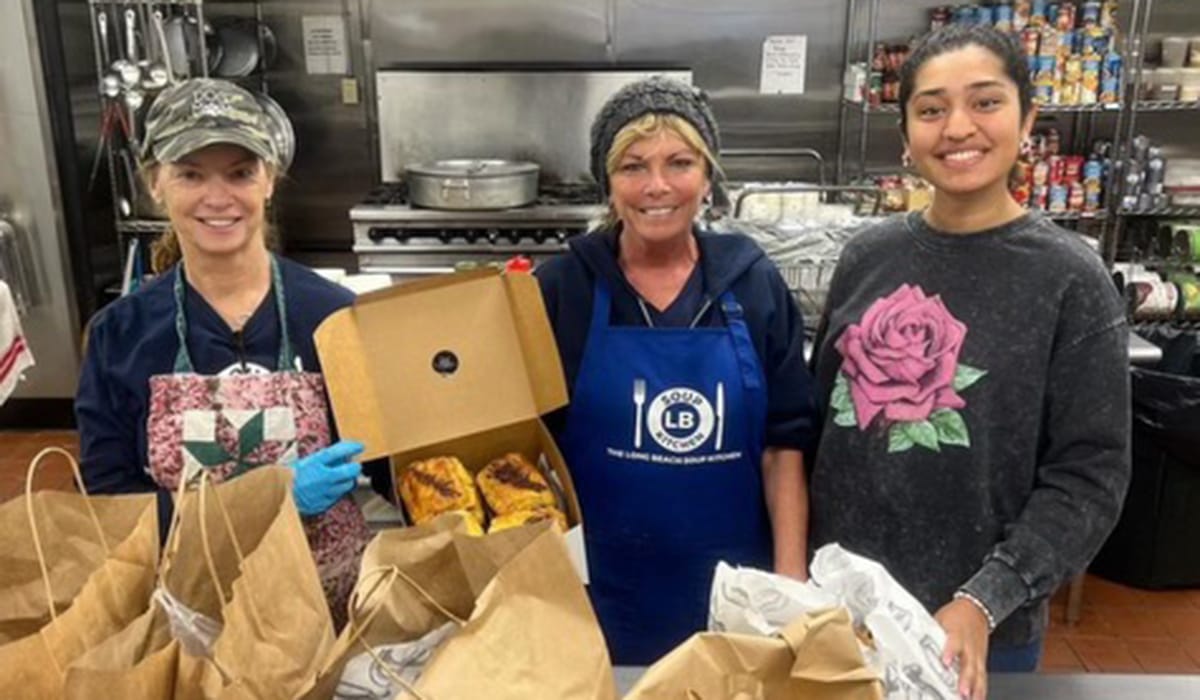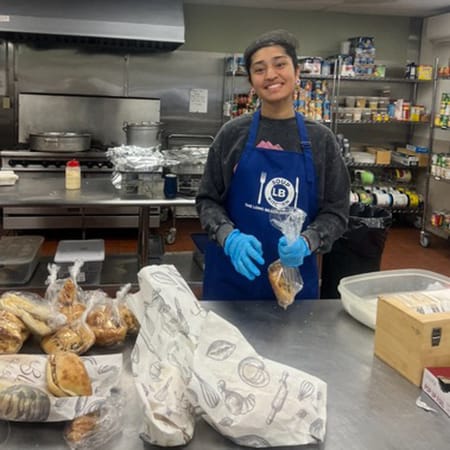Long Island Teen Helps Reduce Food Waste and Hunger

Meet Daily Point of Light Award honoree Misha Gujja. Read her story, and nominate an outstanding volunteer or family as a Daily Point of Light.
Sixteen-year-old Misha Gujja’s main hobby is being a science researcher. She is fascinated with anything related to nutrition, and because science and technology can potentially play a huge role in eliminating global hunger, Misha loves the idea of using STEM to promote sustainable agricultural development and reduce food waste. She is also a national level fencer. Fencing has taken Misha to many places around the country where she can observe different ways of living, food systems and what’s outside of her “New York bubble.”
While Misha is currently focused on solving the last-mile food distribution challenge (a term for when food goes to waste before it even reaches the consumer) through her nonprofit, Fork and Spoon, she is also a science researcher working on finding solutions to increase agricultural productivity and minimize resource waste. Misha plans on pursuing a career related to nutrition and healthcare.
What inspires you to volunteer?
My family comes from rural India and we have a farming background for generations. I’m very close to my maternal grandfather, who grew up farming. He lives with us on Long Island now, but people still work his land in India, and he goes back every few months to check on things. I’ve gone back with him several times. Our family history and personal experiences have given me a respect for the land and the people and communities it sustains.
During the pandemic, I read a Long Island Advocate article about how Nassau County was ranked fifth in the nation for food insecurity. Looking around me, I started noticing the incredible disparity between food waste and hunger. In the city, food insecurity and food waste are “in your face.” You can see it everywhere. It’s very obvious. But when we moved from Brooklyn to Nassau County, I was shocked to see more covert food insecurity and food waste.
What really shocked me was when I discovered that millions of pounds of food are thrown away by restaurants every year while food banks are turning people away because they have run out of food!
I have seen firsthand that sustainable agriculture and farmer livelihoods work in tandem to end hunger and improve food security around the world. I am now focused on ways to support small-scale farms and restaurants and markets in helping to end food insecurity and food waste.

Tell us about your volunteer role with Fork and Spoon.
Forty percent of our nation’s food supply is wasted every year. That is food that can be used to feed people who are starving in the streets and don’t know where their next meal is coming from. Fork and Spoon partners with Long Beach Soup Kitchen and Pronto of Long Island to facilitate food distribution. We source our donated food from three local Long Island cafes and restaurants. Blé Cafe and Bakery donates pastries, sandwiches, breads, baked goods. Fly Me to the Moon donates baked goods but on the fancier side, such as tarts and specialty pastries. Bosphorus Cafe and Grill donates frozen raw meat. Together, these three establishments donate over 50 pounds of food every week.
We also partner with Aloh Sanitizer, which donates hand sanitizing wipes, and we’re working on connecting with more distribution partners.
Our partners include The Long Beach Soup Kitchen which is a traditional soup kitchen, and Pronto Long Island, which is more aimed at food-insecure people who want to cook at home. Pronto is a combination of food bank, thrift shop and community resource center that offers English and financial literacy classes. What’s unique about Pronto is that they prepare shopping carts for a week’s worth of groceries for families, taking away the stress of shopping from people who already work multiple jobs just to survive.
Through community alliances, Fork and Spoon serves over 15,000 meals annually across Long Island. I spend about 35 hours each month with Fork and Spoon. We have an amazing team of eight high school students from across Long Island.
Currently, I am working on fundraising for food security in the United States and abroad.
What are your long-term plans or goals for Fork and Spoon?
I would love to go international with Fork and Spoon. The core structure can be implemented in many different countries: simply, how to distribute a restaurant’s or a market’s leftover food to feed hungry people instead of wasting all that food. I’m also fundraising for sustainable change. I’ve raised over $10,000 to work with local farmers and Indian research and development organizations to increase agricultural productivity and reduce food waste.
My current distribution does not partner with supermarkets. I am working on an outreach program and partnering with a food distributor in Long Island to help us expand, since many of our volunteers don’t have a driver’s license yet.
There is a tremendous amount of water, nutrient and resource waste in farming, especially in less developed areas. My goal is to make small farms become more efficient so that they can drive sustainability and help end food insecurity.
What’s been the most rewarding part of your work?
I love seeing the smiles on people’s faces when they accept donated food I’ve given to the soup kitchens. It feels good to know that the work I’m doing is affecting individual humans. Through community networks, we make sure our neighbors have access to healthy foods year-round. This is a multi-faceted impact since people living below the poverty level can’t afford healthy food like fresh produce. With the rising cost of groceries, they are forced to choose unhealthy processed food which then leads to obesity and long-term health consequences. We aim to provide them with healthy alternatives to improve not only their food security but their health.
What have you learned through your experiences as a volunteer?
I’ve become more aware of my own food usage and food waste. I’m now more mindful of food waste, and the types of food I buy. High schoolers can make change. While change may seem unreachable, that isn’t the case. Many people want to work with a younger audience.
We are the next generation and making change is important.
Tell us about future partnerships, programs or events that you are excited about.
I would love to partner with Misfits Market and World Central Kitchen to bring the issue of food waste to a larger audience and serve more people
Why is it important for others to get involved with causes they care about?
Volunteering empowers high school students to make change. There are so many age restrictions on what we want to do, so organizations like Fork and Spoon encourage high school students to pursue change in their own communities. We are the future!
Any advice for people who want to start volunteering?
Every small deed counts, and it’s never too early or late to start. Reaching out to local organizations in their area would be a good start. Often, smaller nonprofit organizations may be more in need of volunteers and help, and these are a wonderful jumping off point to start one’s service journey.
What do you want people to learn from your story?
I want people to learn that food waste and insecurity are present all around the world, even in places typically seen as affluent. Raising awareness for and combating these issues is extremely important, and people of all ages can take action.
Do you want to make a difference in your community like Misha? Find local volunteer opportunities.
